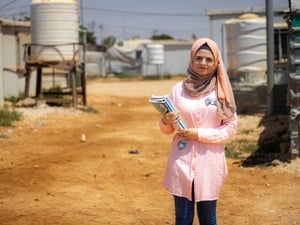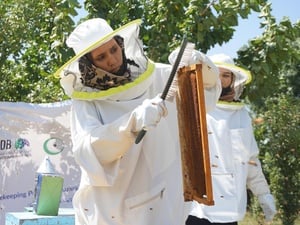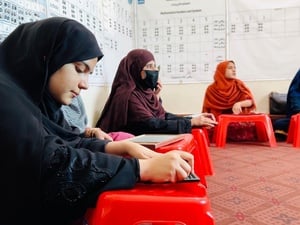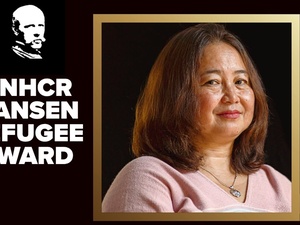Q&A: UNHCR team helps women in eastern Libya
Q&A: UNHCR team helps women in eastern Libya

Reem Alsalem (far right) with colleagues in eastern Libya.
BENGHAZI, Libya, July 5 (UNHCR) - The UN refugee agency is part of a UN mission deployed in the eastern Libyan port of Benghazi to assist civilians affected by the conflict. The small UNHCR team includes four women who are working to support forcibly displaced Libyans, with a focus on women's protection. Reem Alsalem, who heads the UNHCR team in Benghazi, has been working with UNHCR since 1999. She has worked in the field and in UNHCR's Geneva headquarters, mainly as a protection officer. She now heads the agency's office in Barranquilla, northern Colombia. Alsalem spoke recently by phone with UNHCR's social media coordinator, Alexandra Eurdolian. Excerpts from the interview:
How did you end up in Libya?
When the Libya crisis started, I received e-mails quite early on, asking if I would be available to be deployed. This is probably because I am an Arabic speaker. Secondly, as a desk officer for North Africa in 2009 in Geneva, I worked extensively on Libya and travelled there often. At that time, we had the push back [to North Africa] of mixed migrants [on boats], including people in need of protection who were intercepted by the Italians at sea. So when the current crisis happened, I suppose it was natural that our colleagues thought of me.
Can you describe some of the Libyan women you have met?
Recently, we spoke to a female cleaner about life in Libya and how things have changed for women. As with any country in conflict, there are always pros and cons. On one hand, at least in the east, many women and men feel a lot freer and proud of what their people have achieved. On the other hand they fear for their future security. There are also economic difficulties because their husbands are not working. Women find that they have to go out and work and fend for their families. Like this cleaner, she was the only income earner for her family.
At the same time, there is a huge sense of solidarity and compassion towards each other and also to the larger Arab nation because of what's happening in the region. But they are also aware that this is the first time Libyans have become displaced and they are keen to know and to learn how other countries have responded. I am amazed by the level of openness from the local authorities and average people. We have tried to respond and have conducted three training sessions for the Ministry of Justice, local authorities and NGOs.
Can you comment on reports of violence against women in Libya?
While we don't have first-hand reports of this, it cannot be excluded that sexual violence against women and children - in the context of the conflict - did happen. We know that if there are women out there who have gone through this, it must be very difficult for them to live with the consequences, both physical and emotional. Not being able to talk about this terrible experience even to their closest family members, and not getting the adequate treatment. One of the biggest barriers to women seeking help is the fear of being exposed. That's one of the greatest challenges and protection consequences for women, both for refugees in Tunis and Egypt, and also for the displaced here in Libya.
We're also trying to set up a proper referral method, to beef up the presence of medical and psychosocial workers, especially outside Benghazi. Another priority is to strengthen prevention mechanisms together with local authorities, other UN agencies and NGOs.
Describe the people you work with
When I arrived here, I joined four other colleagues - all women, with the exception of our security officer. Two of these women are Arab; Maryem is from Morocco and Walaa is also Jordanian-Palestinian like me. Ana is from Spain. We are all in the same age group, and have been with UNHCR for between eight and 12 years. We are all strong characters and determined. We don't easily take no for an answer, but above all we love what we do.
Given that you are all women, how freely can you move around?
We have a lot of restrictions on our movement, because of security regulations. We are in the process of setting an office up. Before, we were working from our rooms in the UN guesthouse, and now we work from the World Health Organization office. Women are allowed to drive, but it is not that common for women to be driving on their own. So we try to go out in groups or to have a male companion with us.
How has your background impacted your work?
Even though three of us are Arab, the culture in Libya is still quite different because we come from places that are less conservative. That means a bit of adjustment. Still, I think our background gives us an instant, automatic edge, because people are more open, welcoming and warm. There are many Palestinians and Moroccans who live in Libya, so in a way they are not considered foreigners. There is an instant connection that makes work a lot easier. We also automatically understand people's thinking, concerns and the subtle messages which may not be that obvious to other people.









